Key takeaways:
- Longitudinal studies provide deeper insights into human behavior and societal trends over time, capturing changes that snapshot studies cannot.
- The emotional connection between researchers and participants enhances qualitative findings, transforming data into meaningful narratives.
- Challenges such as participant retention, data collection inconsistencies, and translating findings into actionable insights are significant hurdles in longitudinal research.
- Flexibility, clear communication, and celebrating small victories are crucial for successful longitudinal studies and participant engagement.
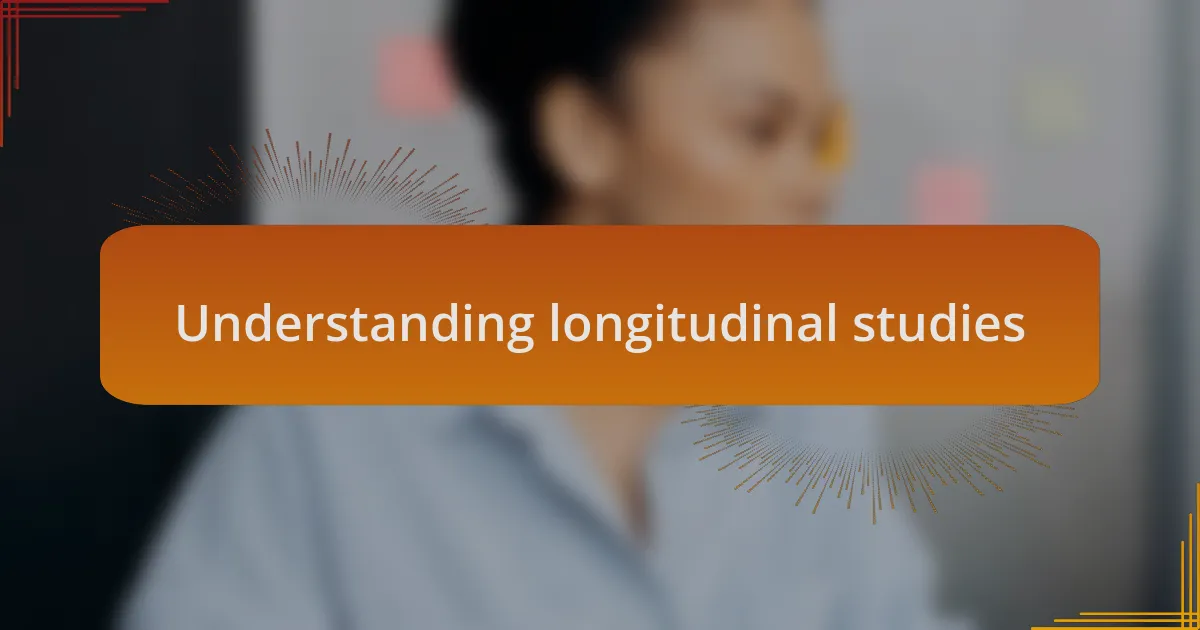
Understanding longitudinal studies
Longitudinal studies are a powerful research method that involves repeated observations of the same subjects over a prolonged period. I remember the excitement during my first encounter with one of these studies; it was fascinating to see how trends and patterns emerged over time. Have you ever wondered how our understanding of social behaviors evolves? Longitudinal studies provide the key to this insight, allowing researchers to capture changes and developments that snapshot studies simply can’t.
Through my experiences, I’ve observed that these studies can uncover the nuances of human behavior in ways that static data cannot. Imagine tracking a group of individuals as they navigate through significant life events like marriage, career changes, or parental roles—each moment adding depth to the overall picture. I often ask myself, what would we miss if we only looked at a single moment in time? The richness of data obtained from longitudinal research often leads to more effective social interventions.
One thing that stands out to me is the emotional investment that comes with longitudinal studies. As researchers build relationships with participants, they often find themselves emotionally entwined in their journeys. I’ve felt a sense of responsibility when observing how these studies impact participants’ lives, reminding me that behind every data point lies a personal story waiting to be told. Isn’t it incredible how these stories shape our interpretation of social innovation?
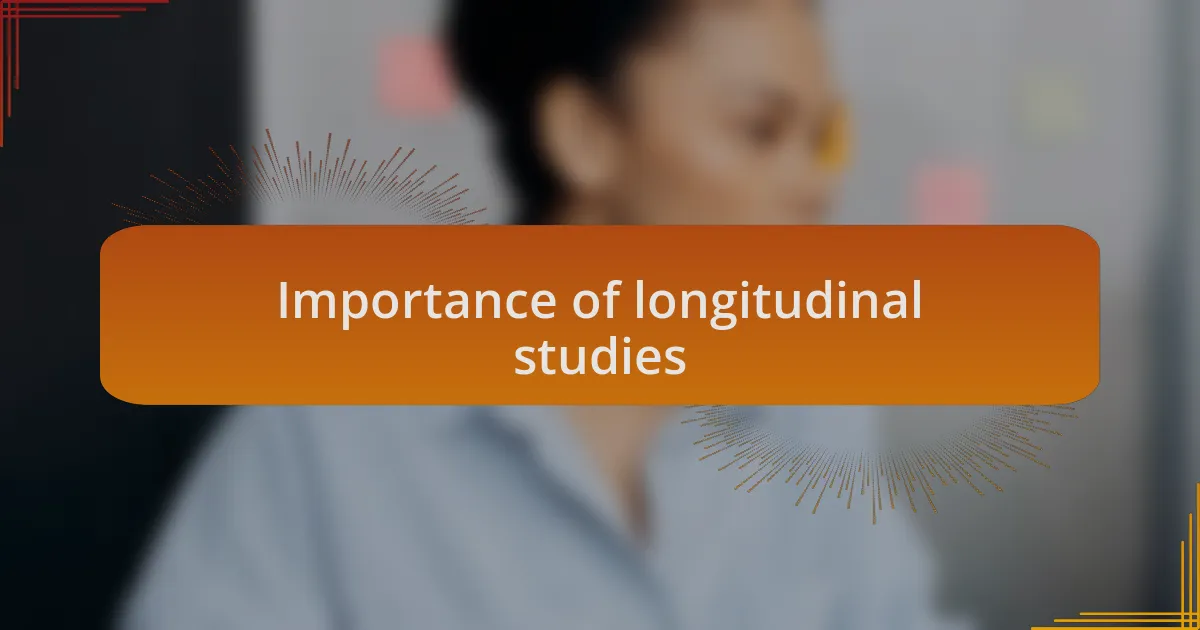
Importance of longitudinal studies
Longitudinal studies are crucial because they offer a lens through which we can observe changes over time. I recall a project where we tracked participants over several years, which revealed how their perspectives on social issues evolved as they faced different life experiences. Isn’t it intriguing how an individual’s journey can illuminate broader societal shifts?
The consistency in data collection allows researchers to identify causal relationships that are often missed in shorter studies. I remember vividly the moment we connected the dots between economic fluctuations and family stress levels; it was a breakthrough that only longitudinal data could provide. Have you ever considered how much more meaningful our interventions could be if we understood the “why” behind the changes?
Another compelling aspect of longitudinal studies is their ability to foster relationships between researchers and participants. I often found myself forming bonds with the people involved, and this emotional connection enriched the qualitative aspects of our findings. Doesn’t that personal engagement add layers of depth to the research, making the data not just numbers, but narratives filled with human experience?
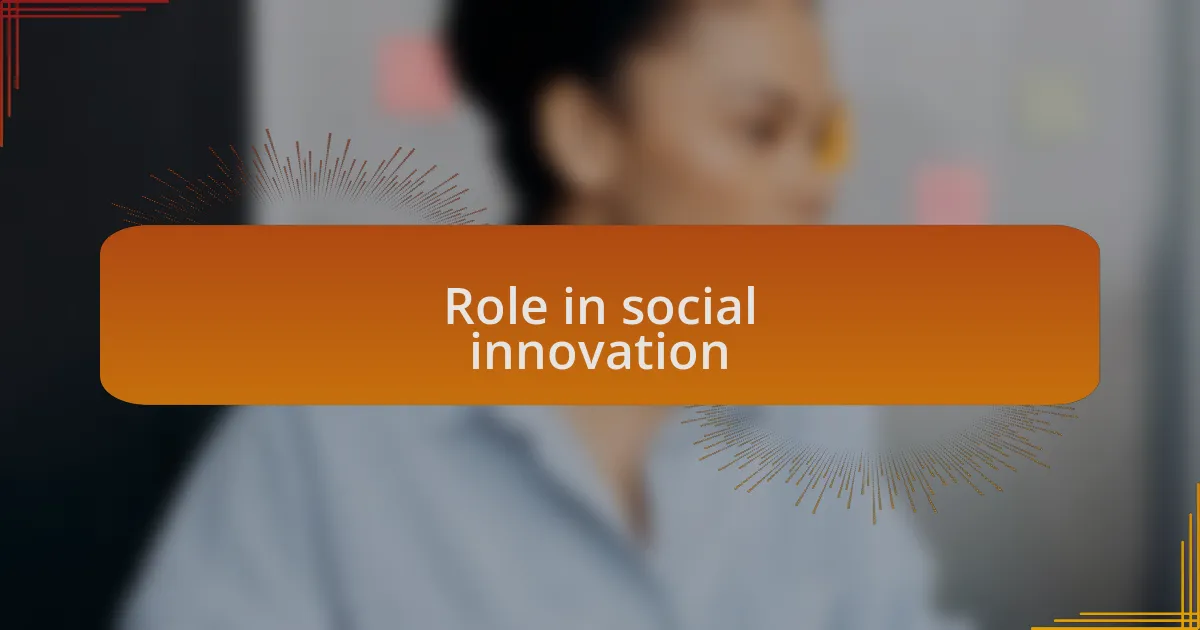
Role in social innovation
The role of longitudinal studies in social innovation is profound because they provide a comprehensive understanding of societal changes over time. I recall one initiative focused on education reform, where we followed a cohort of students for multiple years. Witnessing their struggles and successes firsthand was eye-opening; it truly underscored how educational policies can shape lives. Have you considered how a single, well-documented student’s journey might inform broader educational practices?
Moreover, longitudinal studies allow innovators to tailor solutions to evolving needs, responding dynamically to societal shifts. For example, I once worked on a project that examined community health initiatives. By revisiting the same neighborhoods over several years, we observed changing patterns in health behaviors. This insight empowered us to adapt our strategies to what’s actually working on the ground. Isn’t it fascinating how real-time data can transform theoretical approaches into impactful actions?
Additionally, these studies often bring diverse stakeholders together, creating a collaborative environment essential for social innovation. In my experience, when researchers, community members, and policymakers engage consistently, the resulting dialogue fosters trust and shared ownership of the outcomes. Have you felt the difference when everyone is invested in a collective journey? This synergy can fuel innovative ideas and lead to sustainable changes in the community.
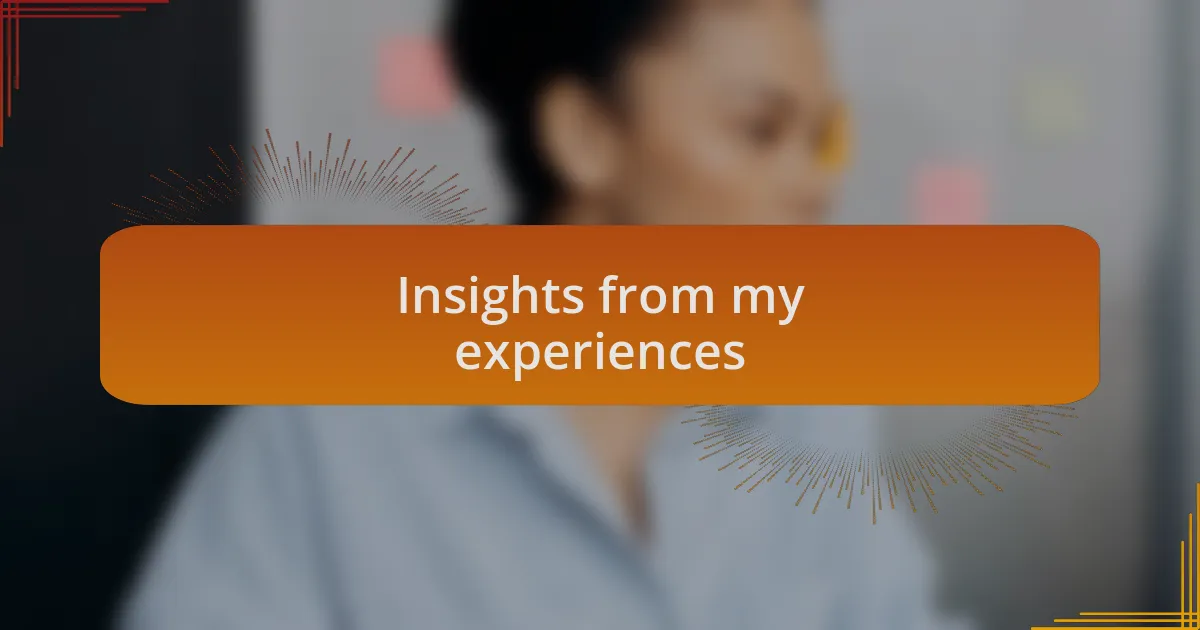
Insights from my experiences
Reflecting on my experiences, I’ve often found that the depth of understanding gained from longitudinal studies is unmatched. I remember a project where we tracked participants over several years regarding their employment transitions. The personal stories shared during our interviews were incredibly moving. One participant’s journey from joblessness to a fulfilling career not only inspired me but also highlighted the importance of ongoing support systems. How does someone’s life story influence your perspective on social change?
Additionally, I’ve encountered moments that tested my perceptions about community resilience. In a longitudinal study focused on urban revitalization, I saw neighborhoods transforming in response to external pressures, like economic downturns and shifts in public policy. One community leader shared her struggles, yet her unwavering commitment to her neighbors left a profound mark on me. It made me realize that social innovation isn’t always about grand strategies; sometimes, it’s about nurturing grassroots efforts and celebrating small victories. Have you ever witnessed such resilience in your community that changed your understanding of social progress?
Through these experiences, I’ve come to appreciate how longitudinal studies can effectively bridge personal narratives with broader systemic trends. When the data we collect translates into real stories and real lives, it becomes a powerful tool for advocacy. For instance, I recall a time when data we gathered about youth engagement led us to launch initiatives that directly addressed their needs. The joy and excitement from participants signaling that they felt heard reminded me that every statistic represents a life. Isn’t it fascinating how data can evoke such meaningful change?

Challenges faced in studies
One of the most significant challenges I faced in longitudinal studies was the issue of participant retention. I remember a particular project focused on health and wellness where many participants dropped out over the years. It was disheartening, especially when I had built relationships with some of them. This experience made me wonder: what strategies can we implement to keep participants engaged? It’s critical to find ways to ensure they feel valued and invested throughout the study.
Then there’s the complexity of data collection itself. In one study examining educational outcomes, I encountered inconsistent reporting from participants, which complicated the analysis. I found myself reflecting on how important it is to create clear, consistent methods for gathering data that participants can stick to. Have you ever thought about how small discrepancies can heavily influence data integrity?
Finally, I often grappled with the challenge of translating findings into actionable insights. After years of collecting data, I once struggled to present it in a way that resonated with stakeholders. I vividly recall presenting to a group of educators who needed practical solutions. It hit me that data alone isn’t compelling; storytelling makes the findings relatable. How can we bridge that gap between data and action? This is a continuous challenge for social innovators, but it’s also an opportunity to create meaningful change.
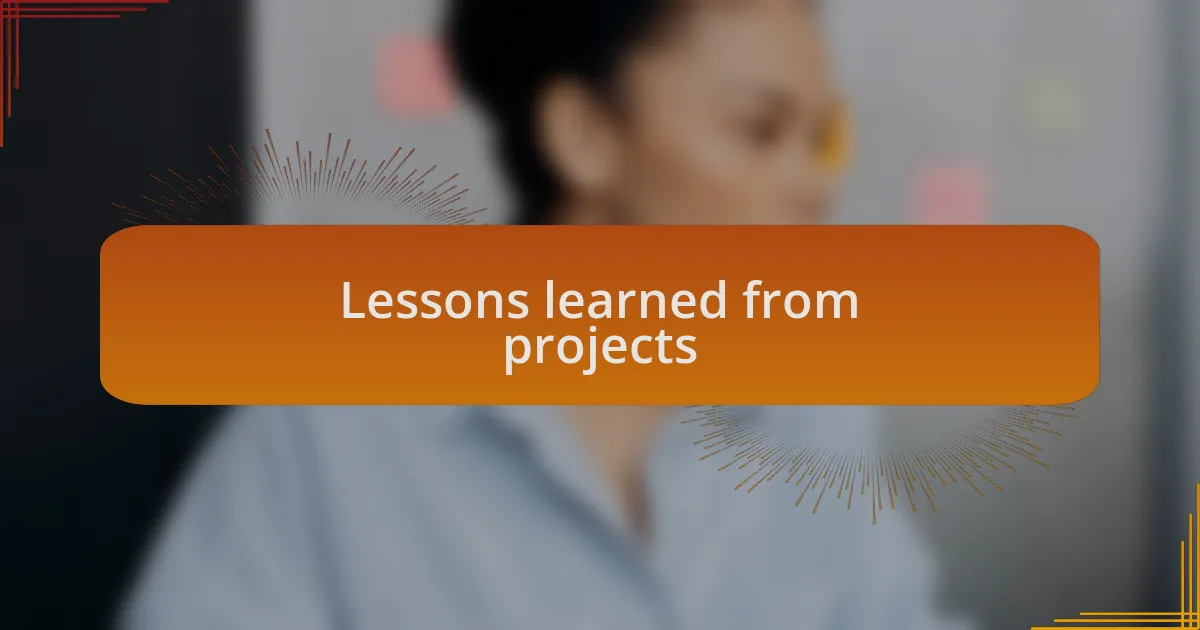
Lessons learned from projects
One significant lesson I’ve learned from various longitudinal projects is the power of flexibility. In a community engagement initiative I was part of, our approach had to shift midway due to unforeseen local circumstances. Instead of clinging to the original plan, embracing adaptability not only kept us on track but also strengthened our relationship with participants. How often do we let rigid frameworks hinder our progress?
Additionally, I realized that communication is key in these studies. During an education project, we developed a survey that many participants found confusing due to its technical jargon. After receiving feedback, we revamped it to be more straightforward. The surprise came when clarity led to a noticeable increase in response rates. It reminded me that simplifying can sometimes be the most effective strategy—what if we prioritized understanding over complexity?
Lastly, I learned the importance of celebrating small wins along the way. In one health study, even minor improvements in participants’ behaviors weren’t acknowledged at first. When we started highlighting these achievements, the motivation levels skyrocketed. This taught me that recognizing progress—no matter how small—can fuel continued engagement. Could this practice transform how we view the success of our initiatives?